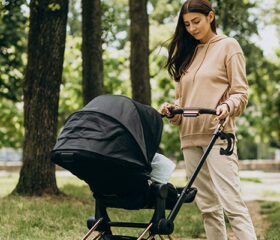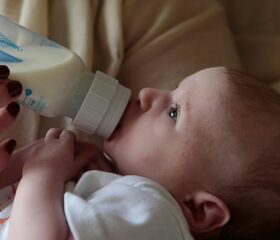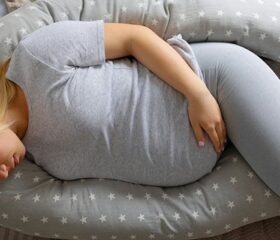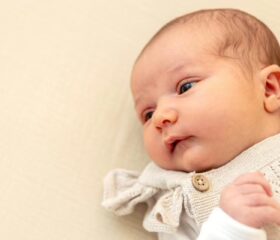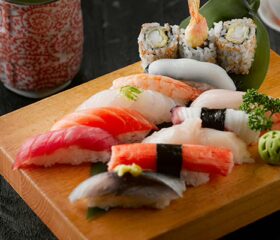How Long Is Formula Good For? Preparation and Storage Tips
Many mothers choose to feed their babies formula, either as a regular or occasional thing. It can be more convenient than breastfeeding, and sometimes, it’s also nice to give your sore breasts a rest.
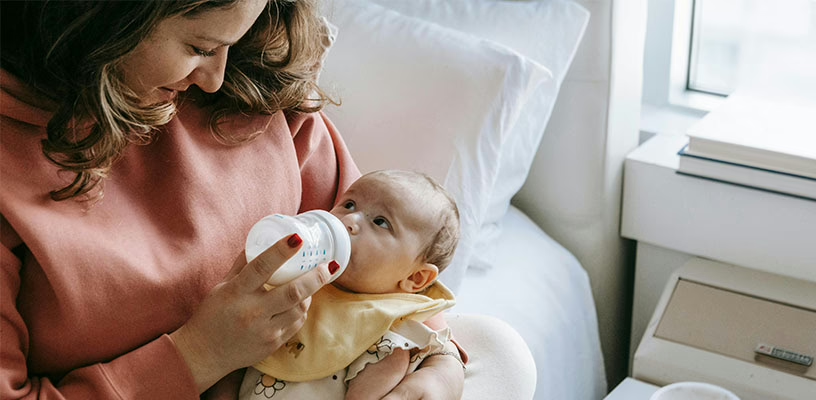
Unfortunately, there might come days where you spend all morning preparing your baby’s formula, only for them to not finish it.
If you have formula left over, it can be tempting to try to salvage what’s left, especially considering how costly it can be. However, doing this can be risky for your little one. Prepared formula can only sit at room temperature for a limited time before it becomes unsafe to use.
Exactly how long is formula good for, and how can you properly store your baby’s formula milk? Read on to find out.
How long can formula sit at room temperature?
The exact length of time you can leave prepared formula out varies slightly depending on the brand and the type of formula it is. Always check the instructions on your product for the most accurate guidance.
With that said, the most important factor that affects how long your baby’s formula will last is whether or not they’ve started drinking it.
Untouched formula
If your baby hasn’t touched the formula you’ve made yet, you don’t need to throw it out straight away. Untouched formula can remain at room temperature for up to 2 hours after preparation.
Beyond this window, bacteria will start to grow, and may make the formula unsafe for your baby.
You can, however, store untouched formula in the refrigerator once you’ve prepared it, which we’ll explain in more detail further down.
Partially consumed formula
When it comes to formula that your baby has already drunk, the window during which it remains safe to use is much smaller.
Once your baby starts drinking from a bottle, bacteria from their saliva will grow rapidly in the formula. Always discard any remaining formula after 1 hour to prevent your baby from getting sick.
Can you refrigerate prepared formula milk?
Similarly, if your baby starts drinking formula milk and doesn’t finish it, you can’t refrigerate it.
However, if you’ve made too much formula, then you can store the excess safely, as long as it hasn’t been touched yet.
Storage guidelines for prepared formula
The storage guidelines for baby formula differ based on the type it is:
- Powdered formula: If this is prepared but unused, it can be stored in the refrigerator for up to 24 hours. Note that open containers of powdered formula (that hasn’t been prepared) should never be stored in the refrigerator, as moisture can cause clumping and spoilage.
- Liquid concentrate and ready-to-drink formulas: Once opened, these can be refrigerated for 48 hours.
To store formula safely in the refrigerator:
- Always seal the bottle or container tightly to prevent contamination.
- Store it on a refrigerator shelf rather than in the door. The door’s temperature fluctuates more, which can compromise the formula’s quality.
Is it safe to reheat formula milk?
Many babies prefer warm formula milk. It’s safe to warm up your baby’s milk—once. However, you should never reheat leftover formula milk.
Bacteria introduced during feeding can reproduce quickly, and reheating formula only accelerates this process. 1
If you’re planning to heat your baby’s formula milk, make sure you do it safely. Use methods like a warm water bath or a bottle warmer to gently heat the formula. This ensures that it heats more evenly.
Never heat your baby’s formula in the microwave. This can create hot spots inside that may burn your baby’s mouth.
Always test your baby’s formula first
However you warm up your baby’s formula, you should always test its temperature on your wrist before feeding. It should feel warm, but not hot.
If it’s too hot, it’s perfectly fine to let it sit for a few minutes, run the bottle under a cold faucet, or even put it in an ice bath to let it cool down.
Is it safe to freeze formula milk?
Avoid freezing baby formula. Doing so can cause the essential nutrients in it to break down, as well as alter its texture and taste. Not only does freezing formula reduce its quality, your baby probably won’t enjoy it, either.
How long can unused formula milk last for?
The shelf life of unprepared formula depends on whether the container is opened or unopened.
Unopened formula
Check the “use by” date printed on the container, as required by the Food and Drug Administration (FDA). 1 Doing this is the only surefire way to check that the formula hasn’t gone bad yet.
Store unopened formula in a cool, dry location, away from direct sunlight, heat, or humidity. Avoid places like cars or garages where extreme temperatures can compromise the formula’s quality.
Opened formula
You should use powdered formula within 30 days of opening to prevent degradation and contamination. Write the date of opening on the container to keep track of its freshness.
Store opened powdered formula in a cool, dry place with the lid tightly closed.
Other mistakes to avoid when giving your baby formula
As you’ve seen, incorrectly preparing or storing your baby’s formula can render it unsafe to drink. There are other common mistakes you’ll need to watch out for when feeding your little one:
Diluting formula with extra water
If you’re on the last fews scoops of your powdered formula, it makes sense if you’re tempted to add extra water to stretch it out.
While this might seem harmless enough, adding extra water to formula can dilute its essential nutrients. This can cause your baby to develop nutritional deficiencies and even lead to serious health issues, such as water intoxication.
Water intoxication can be life-threatening. For this reason, babies under 6 months should never drink plain water. Diluted formula isn’t quite as risky as water, but it’s still dangerous!
You can avoid diluting formula too much by first adding an appropriate amount of water to your baby’s bottle, then adding the formula powder after that, which makes it easier to regulate the water-to-formula ratio.
Of course, if you opt for ready-to-drink formula, that will further eliminate the risk of you diluting the formula.
Using too much formula
On the other hand, using too much formula can also cause problems, such as gastrointestinal issues (i.e., an upset stomach). Always follow the mixing instructions on the packaging and use the scoop provided inside.
Using the wrong scoop size
On that note, let’s say you bought a new brand of formula and want to use the scoop from the last can. Seems harmless, right? Think again. You should never mix scoops from two different brands.
Each manufacturer has different scoop sizes. If you use the wrong scoop, you could be diluting the formula too much, or, conversely, making a mixture that’s too strong.
Always carefully read the formula can’s instructions before preparing any for your baby.
Tips for safely giving your baby formula
Now that you’re aware of what not to do, here are some tips to help you safely give your baby their formula:
Wash your hands and sanitize your baby’s feeding equipment
This might seem like a no-brainer, but you should thoroughly wash your hands with soap and water before handling formula.
Aside from keeping your hands squeaky clean, make sure bottles, nipples, and any other preparation tools are fully cleaned and sanitized to minimize the risk of contamination.
Use boiled water for powdered formula
When feeding infants under 2 months old, premature babies (preemies), and immunocompromised babies, boil water and let it cool for 5 minutes before mixing it with powdered formula. This step helps kill bacteria that may be present in the formula.
As mentioned, it’s best to add the water to the bottle first, then scoop the formula in after. This makes it harder to add too much or too little.
Alternatively, instead of using boiled tap water, you can also use a water purifier or low-fluoride bottled water.
Check the water quality in your area
While most US tap water is safe for babies to drink, some areas may have contaminated water. If you’re unsure, check with your local health department.
US tap water also contains fluoride. In small amounts, this is harmless, but too much can cause fluorosis in your baby, which is characterized by staining on their teeth. 2
It’s a good idea to use a water purifier or opt for a low-fluoride bottled water for your baby’s formula. If you have private well water, get it tested for contaminants before mixing it with formula.
Check with your doctor before switching formulas
In most cases, mixing or switching between formulas is safe, as all infant formulas must meet strict nutritional standards set by the FDA.
However, some babies may be sensitive to certain ingredients. If you’re considering switching brands, consult your pediatrician for guidance, especially if your baby has special dietary needs.
Final thoughts
As sad as it is to have to throw out perfectly good formula, in some cases, it’s unavoidable. By following the recommended guidelines for handling, storing, and using formula, you can minimize the risk of contamination, ensure your baby receives the nutrition they need, and avoid wasting more of that liquid gold than you have to.
As always, consult your pediatrician if you have any concerns, especially if your baby has any preexisting conditions or allergies that make you feel nervous about feeding them formula.
Article Sources
- U.S. Food and Drug Administration. "Handling Infant Formula Safely: What You Need to Know" Retrieved September 4, 2025.
- Hurst Pediatric Dentistry. "What Is Fluorosis?" Retrieved September 4, 2025.

